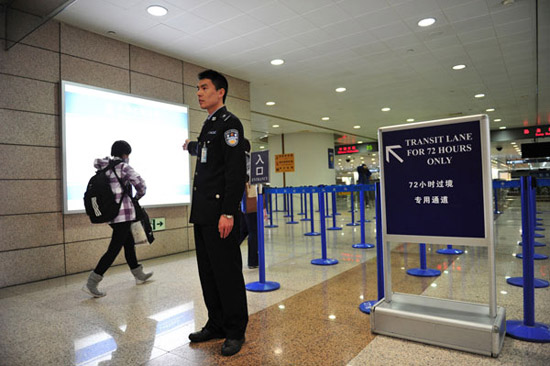
 |
| A police officer directs transit passengers through the 72-hour visa-free lane at Shanghai Pudong International Airport. Transit passengers from 45 countries have been allowed to stay in the city for 72 hours without a visa since January. YANG XIAJIE / XINHUA |
A new policy that allows overseas passengers to stay in Shanghai for 72 hours without a visa has benefited 3,800 people since it took effect on Jan 1, tourism statistics showed on Wednesday.
Although the city's tourism administrative department considers the policy successful in luring more overseas tourists, industry professionals said the program still has room for improvement and called for more publicity about the policy.
To cement its reputation as a global tourist destination, Shanghai has allowed citizens of 45 countries to get a 72-hour visa-free stay in the city since the beginning of this year.
Before the new policy, tourists from some countries were allowed to stay in the city for 48 hours without a visa, a rule that had been in effect since January 2000.
By Tuesday, about 3,800 foreign tourists, or about 25 a day, had taken advantage of the policy, according to figures provided by the city's two airports.
“The increase (in the number of travelers) encouraged by the new policy is obvious,” Chao Xiaohui, an official from the international department of Shanghai Municipal Tourism Administration, told China Daily on Wednesday over the phone.
“In all of last year, only 3,000 foreign tourists were attracted to the city by the two-day visa-free policy.”
However, tourist-industry workers and professionals consider the figure to be low, especially compared with the total number of inbound travelers that Shanghai receives.
The number of overseas travelers the city has received so far this year has not been released, but official figures showed that Shanghai received about 8 million foreign tourists, or about 22,000 a day, every year in the past two years.
Wang Hongyuan, a manager of the travel agency SAL Tour who is in charge of inbound tourism, said the main reasons behind the “not-that-satisfactory result” are the failure to promote the policy globally as well as the city's tardiness in billing itself as an international transfer station.
“Shanghai is more of a terminal rather than the transfer stop for most foreign airlines,” he said, adding that the policy works only for tourists who would love to spend a few days in the transfer station of Shanghai on their way to other Asian destinations.
Li Zhongguang, director of the Institute of Industry, China Tourism Academy, said the H7N9 bird flu outbreak in East China also deterred some overseas travelers.
Jiang Yiyi, director of the China Tourism Academy's international tourism development institute, urged tourism authorities to promote the policy more actively.
“The marketing of the policy and tourism products are not strong enough,” she said. “Many of the transit tourists do not know of the benefits after their arrival.”
In contrast with Shanghai's situation, Beijing, the other city that launched the 72-hour visa-free program on Jan 1, has promoted its own policy in Europe.
Beijing travel authorities said on Wednesday that they are still calculating the number of overseas passengers that have benefited from the policy. An earlier expectation is that the new policy may bring at least 2 million more overseas visitors to the capital in 2013.
















 Helicopter hijacking drama over debt issue: Shandong government
Helicopter hijacking drama over debt issue: Shandong government


![]()
